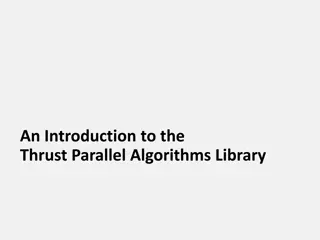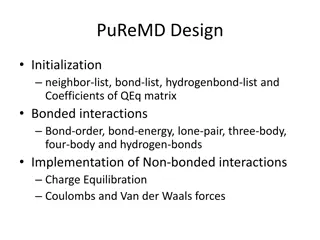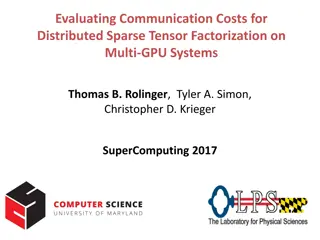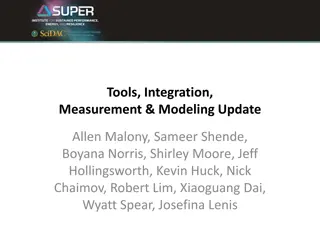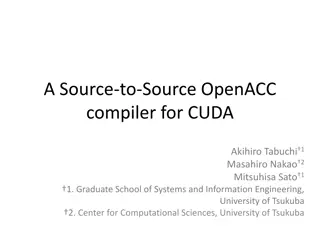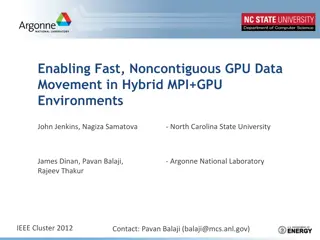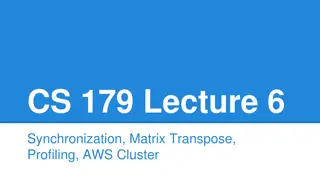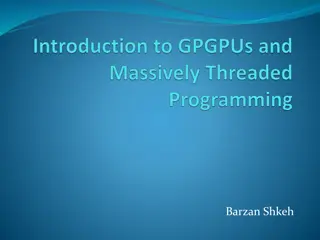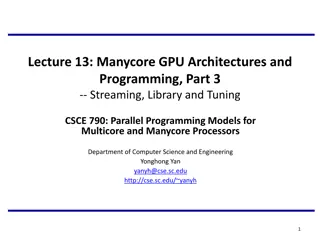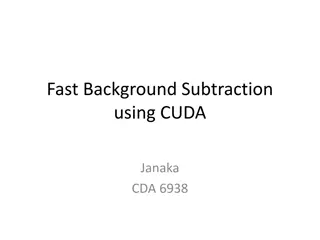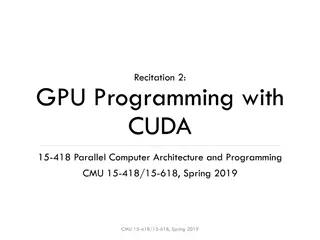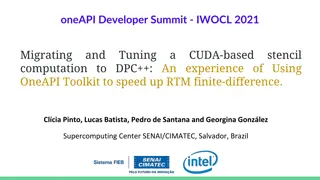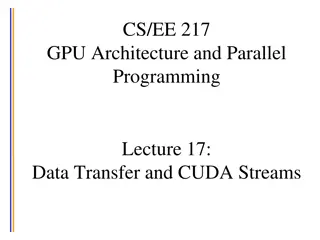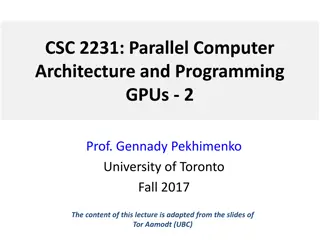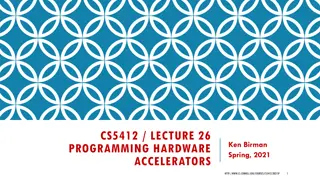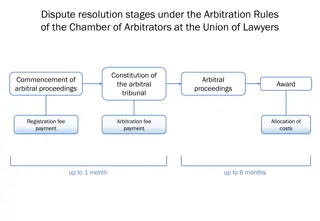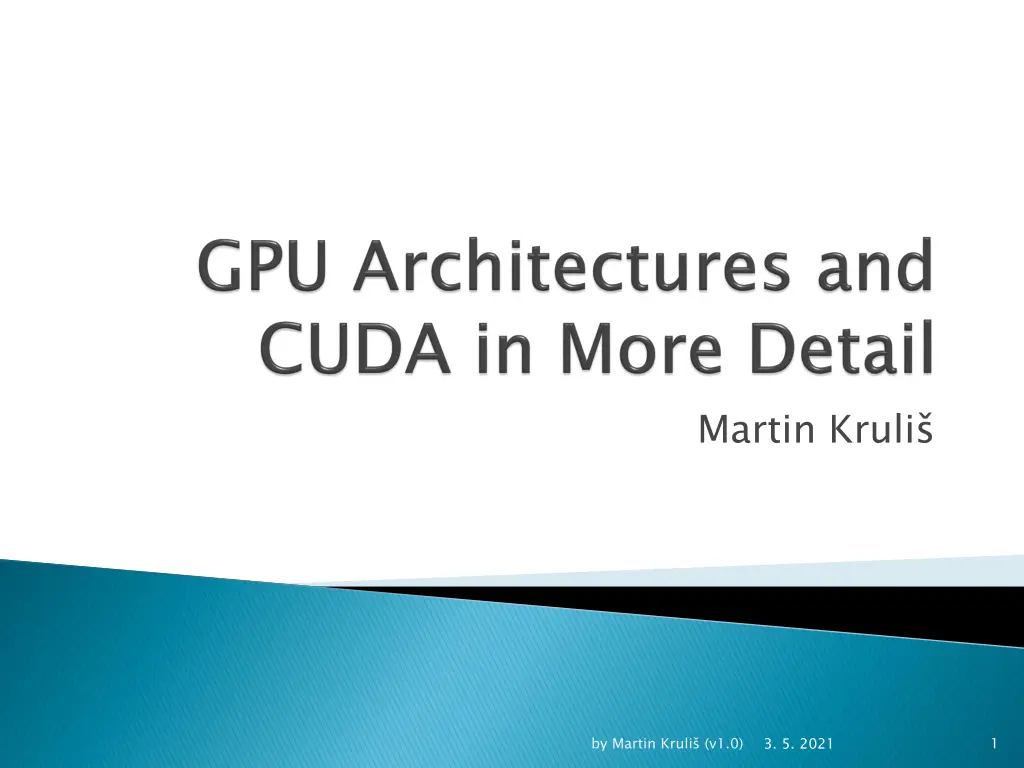
Parallel Computing Insights by Martin Kruli
Explore insights into parallel computing by Martin Kruli, covering topics such as thread assignments, SMPs, warp scheduling, decomposition strategies, context switching, masking instructions, work reorganization, and memory fences in GPU programming.
Download Presentation

Please find below an Image/Link to download the presentation.
The content on the website is provided AS IS for your information and personal use only. It may not be sold, licensed, or shared on other websites without obtaining consent from the author. If you encounter any issues during the download, it is possible that the publisher has removed the file from their server.
You are allowed to download the files provided on this website for personal or commercial use, subject to the condition that they are used lawfully. All files are the property of their respective owners.
The content on the website is provided AS IS for your information and personal use only. It may not be sold, licensed, or shared on other websites without obtaining consent from the author.
E N D
Presentation Transcript
Martin Kruli by Martin Kruli (v1.0) 1 3. 5. 2021
Single Instruction Multiple Threads All cores are executing the same instruction Each core has its own set of registers Instruction Decoder and Warp Scheduler registers registers registers registers registers registers by Martin Kruli (v1.0) 2 3. 5. 2021
How are threads assigned to SMPs Grid Block Warp Thread The same kernel Simultaneously run on SM cores. Threads in a warp run in lockstep. Assigned to SM Core GPU Streaming Multiprocessor by Martin Kruli (v1.0) 3 3. 5. 2021
Decomposition Each block assigned to the SMP is divided into warps and the warps are assigned to schedulers Schedulers Select warp that is ready at every instruction cycle The SMP instruction throughput depends on CC: 1.x 1 instruction per 4 cycles, 1 scheduler 2.0 1 instruction per 2 cycles, 2 schedulers 2.1 2 instructions per 2 cycles, 2 schedulers 3.x and 5.x 2 instructions per cycle, 4 schedulers by Martin Kruli (v1.0) 4 3. 5. 2021
Fast Context Switch When a warp gets stalled E.g., by data load/store Scheduler switch to next active warp by Martin Kruli (v1.0) 5 3. 5. 2021
Masking Instructions In case of data-driven branches if-else conditions, while loops, All branches are traversed, threads mask their execution in invalid branches if (threadIdx.x % 2 == 0) { ... even threads code ... } else { ... odd threads code ... } 0 1 2 3 4 0 1 2 3 4 by Martin Kruli (v1.0) 6 3. 5. 2021
Work Reorganization In case the workload is imbalanced Cheap balancing can lead to better occupancy Example Matrix with dimensions not divisible by warp size Item (i,j) has linear index i*width + j by Martin Kruli (v1.0) 7 3. 5. 2021
Memory Fences __threadfence(); __threadfence_block() __threadfence_system(); Barrier Synchronization between warps in block __syncthreads(); __syncthreads_count(predicate); __syncthreads_and(predicate); __syncthreads_or(predicate); by Martin Kruli (v1.0) 8 3. 5. 2021
Note that details about host memory interconnection are platform specific GPU Device GPU Chip Host Memory SMP Core Registers L1 Cache ~ 25 GBps Global Memory L2 Cache Core Host Core Registers L1 Cache PCI Express (16/32 GBps) > 100 GBps Core CPU by Martin Kruli (v1.0) 9 3. 5. 2021
Access Patterns Perfectly aligned sequential access by Martin Kruli (v1.0) 10 3. 5. 2021
Access Patterns Perfectly aligned with permutation by Martin Kruli (v1.0) 11 3. 5. 2021
Access Patterns Continuous sequential, but misaligned by Martin Kruli (v1.0) 12 3. 5. 2021
Coalesced Loads Impact by Martin Kruli (v1.0) 13 3. 5. 2021
Memory Shared by SM Divided into banks Each bank can be accessed independently Consecutive 32-bit words are in consecutive banks Optionally, 64-bit words division is used (CC 3.x) Bank conflicts are serialized Except for reading the same address (broadcast) Compute capability 1.x 2.x 3.x Compute capability Mem Mem. size . size # of banks # of banks latency latency 16 kB 48 kB 48 kB 16 32 32 32 bits / 2 cycles 32 bits / 2 cycles 64 bits / 1 cycle by Martin Kruli (v1.0) 14 3. 5. 2021
Linear Addressing Each thread in warp access different memory bank No collisions by Martin Kruli (v1.0) 15 3. 5. 2021
Linear Addressing with Stride Each thread access 2*i-th item 2-way conflicts (2x slowdown) on CC < 3.0 No collisions on CC 3.x Due to 64-bits per cycle throughput by Martin Kruli (v1.0) 16 3. 5. 2021
Linear Addressing with Stride Each thread access 3*i-th item No collisions, since the number of banks is not divisible by the stride by Martin Kruli (v1.0) 17 3. 5. 2021
Broadcast One set of threads access value in bank #12 and the remaining threads access value in bank #20 Broadcasts are served independently on CC 1.x I.e., sample bellow causes 2-way conflict CC 2.x and newer serve broadcasts simultaneously by Martin Kruli (v1.0) 18 3. 5. 2021
Registers One register pool per multiprocessor 8-64k of 32-bit registers (depending on CC) Register allocation is defined by compiler All allocated blocks share the registry pool Register pressure (heavy utilization) may limit number of blocks running simultaneously It may also cause registry spilling As fast as the cores (no extra clock cycles) Read-after-write dependency 24 clock cycles Can be hidden if there are enough active warps by Martin Kruli (v1.0) 19 3. 5. 2021
Per-thread Global Memory Allocated automatically by compiler Compiler may report the amount of allocated local memory (use --ptxas-options=-v) ) Large local structures and arrays are places here Instead of the registers Register Pressure The registers are spilled into the local memory by Martin Kruli (v1.0) 20 3. 5. 2021
Global Memory cudaMalloc(), cudaFree() Dynamic kernel allocation malloc() and free() called from kernel cudaDeviceSetLimit(cudaLimitMallocHeapSize, size) Shared Memory Statically (e.g., __shared__ int foo[16];) Dynamically (by 3rdkernel launch parameter) extern __shared__ float bar[]; float *bar1 = &(bar[0]); float *bar2 = &(bar[size_of_bar1]); by Martin Kruli (v1.0) 21 3. 5. 2021
Page-locked (Pinned) Host Memory Host memory that is prevented from swapping Created/dismissed by cudaHostAlloc(), cudaFreeHost() cudaHostRegister(), cudaHostUnregister() Optionally with flags cudaHostAllocWriteCombined cudaHostAllocMapped cudaHostAllocPortable Copies between pinned host memory and device are automatically performed asynchronously Pinned memory is a scarce resource Optimized for writing, not cached on CPU by Martin Kruli (v1.0) 22 3. 5. 2021
Device Memory Mapping Allowing GPU to access portions of host memory directly (i.e., without explicit copy operations) For both reading and writing The memory must be allocated/registered with flag cudaHostAllocMapped The context must have cudaDeviceMapHost flag (set by cudaSetDeviceFlags()) Function cudaHostGetDevicePointer() gets host pointer and returns corresponding device pointer by Martin Kruli (v1.0) 23 3. 5. 2021
GPU Independent device Controlled by host Used for offloading Host Code Needs to be designed in a way that Utilizes GPU(s) efficiently Utilize CPU while GPU is working CPU and GPU do not wait for each other by Martin Kruli (v1.0) 24 3. 5. 2021
Bad Example CPU GPU cudaMemcpy(..., HostToDevice); Kernel1<<<...>>>(...); cudaDeviceSynchronize(); cudaMemcpy(..., DeviceToHost); ... cudaMemcpy(..., HostToDevice); Kernel2<<<...>>>(...); cudaDeviceSynchronize(); cudaMemcpy(..., DeviceToHost); ... Device is doing something useful by Martin Kruli (v1.0) 25 3. 5. 2021
Overlapping CPU and GPU work Kernels Started asynchronously Can be waited for (cudaDeviceSynchronize()) A little more can be done with streams Memory transfers cudaMemcpy() is synchronous and blocking Alternatively cudaMemcpyAsync() starts the transfer and returns immediately Can be synchronized the same way as the kernel by Martin Kruli (v1.0) 26 3. 5. 2021
Using Asynchronous Transfers CPU GPU cudaMemcpyAsync(HostToDevice); Kernel1<<<...>>>(...); cudaMemcpyAsync(DeviceToHost); ... do_something_on_cpu(); ... cudaDeviceSynchronize(); Workload balance becomes an issue by Martin Kruli (v1.0) 27 3. 5. 2021
Stream In-order GPU command queue Asynchronous GPU operations are registered in queue Kernel execution Memory data transfers Commands in different streams may overlap Provide means for explicit and implicit synchronization Default stream (stream 0) Always present, does not have to be created Global synchronization capabilities by Martin Kruli (v1.0) 28 3. 5. 2021
Stream Creation cudaStream_t stream; cudaStreamCreate(&stream); Stream Usage cudaMemcpyAsync(dst, src, size, kind, stream); kernel<<<grid, block, sharedMem, stream>>>(...); Stream Destruction cudaStreamDestroy(stream); by Martin Kruli (v1.0) 29 3. 5. 2021
Making a Good Use of Overlapping Split the work into smaller fragments Create a pipeline effect (load, process, store) by Martin Kruli (v1.0) 30 3. 5. 2021
GPU Instruction Set Oriented for rendering and geometry calculations Rich set of mathematical functions Many of those are implemented as instructions Separate functions for doubles and floats e.g., sqrtf(float) and sqrt(double) Instruction behavior depends on compiler options -use_fast_math fast but lower precision -ftz=bool flush denormals to zero -prec-div=bool precise float divisions -prec-sqrt=bool precise float sqrts -fmad=bool use mul-add instructions (e.g., FFMA) Single precision floats only by Martin Kruli (v1.0) 31 3. 5. 2021
Atomic Instructions Perform read-modify-write operation of one 32bit or 64bit word in global or shared memory Require CC 1.1 or higher (1.2 for 64bit global atomics and 2.0 for 64bit shared mem. atomics) Operate on integers, except for atomicExch() and atomicAdd() which also work on 32bit floats Atomic operations on mapped memory are atomic only from the perspective of the device Since they are usually performed on L2 cache by Martin Kruli (v1.0) 32 3. 5. 2021
Atomic Instructions Overview atomicAdd(&p,v), atomicSub(&p,v) atomically adds or subtracts v to/from p and return the old value atomicInc(&p,v), atomicDec(&p,v) atomic increment/decrement computed modulo v atomicMin(&p,v), atomicMax(&p,v) atomicExch(&p,v) atomically swaps a value atomicCAS(&p,v) classical compare-and-set atomicAnd(&p,v), atomicOr(&p,v), atomicXor(&p,v) atomic bitwise operations by Martin Kruli (v1.0) 33 3. 5. 2021
Voting Instructions Intrinsics that allows the whole warp to perform reduction and broadcast in one step Only active threads are participating __all(predicate) All active threads evaluate predicate Returns non-zero if ALL predicates returned non-zero __any(predicate) Like __all, but the results are combined by logical OR __ballot(predicate) Return bitmask, where each bit represents the predicate result of the corresponding thread by Martin Kruli (v1.0) 34 3. 5. 2021
Warp Shuffle Instructions Fast variable exchange within the warp Available for architectures with CC 3.0 or newer Intrinsics __shfl_sync() direct copy from given lane __shfl_up_sync() copy with lower relative ID __shfl_down_sync() copy with higher relative ID __shfl_xor_sync() copy from a lane, which ID is computed as XOR of caller ID All functions have optional width parameter, that allows to divide warp into smaller segments by Martin Kruli (v1.0) 35 3. 5. 2021
Right amount of threads Saturate SMPs, but avoid registry spilling SIMT Avoid warp divergence Synchronization within a block is cheap Memory Host-device transfer overlapping Global memory coalesced transactions Shared memory banking by Martin Kruli (v1.0) 36 3. 5. 2021
by Martin Kruli (v1.0) 37 3. 5. 2021

